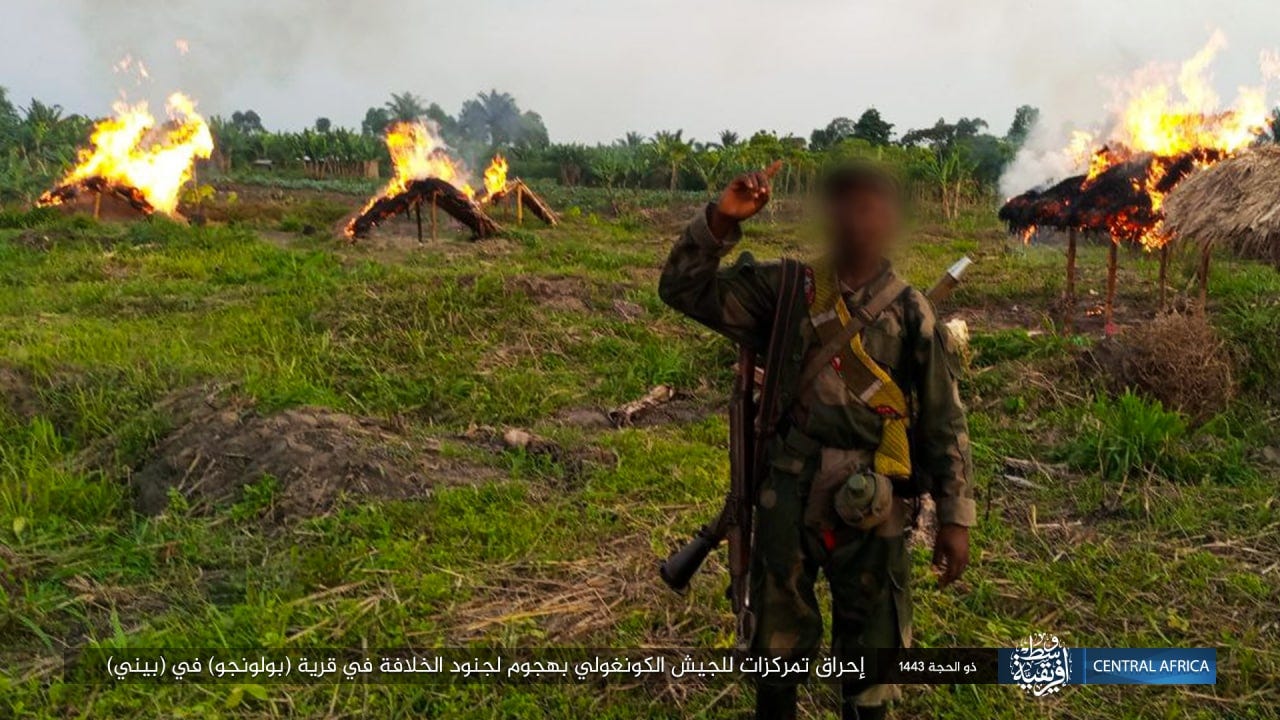MW Weekly: Islamic State Nigeria Jailbreak; Russian Anarcho-Communists Sabotage Railway; Rockets Hit Uzbekistan
ISWAP Springs Hundreds from Nigerian Prison
On July 6, the Islamic State West Africa Province (ISWAP) successfully conducted a mass-scale prison break operation, reportedly freeing 879 inmates, including scores of their own captive fighters, from a complex in Kuje, Abuja. Dozens of ISWAP militants took part in the nighttime assault.
Official statements released by the Islamic State (IS) following the raid detail how three groups of ISWAP militants approached from different flanks, proceeding to blow up entrance gates, breach a surrounding barrier, and engage with prison security personnel.
For the Islamic State, the operation has significance on both the local/regional and global levels. Jacob Zenn, the editor of Jamestown Foundation’s Terrorism Monitor, assessed that ISWAP’s demonstrated ability to pull off such an operation in Kuje, after having conducted several other attacks in Kogi and in recent weeks, confirms ISWAP's expansion into central Nigeria. He added that “Kuje was like the “supermax” for ISWAP, JASDJ, and Ansaru fighters, so this prison break is huge for freeing prisoners, not to mention the global IS promise to “break walls” and free their detained brethren.”
Zenn’s “break walls” remark is in reference to the Islamic State’s history of encouraging its various branches and followers to conduct operations against detainment facilities. On this, Caleb Weiss, senior analyst at the Bridgeway Foundation and research analyst at FDD's Long War Journal, notes that the logic of IS’s “Breaking the Walls” campaign dates back at least as far back as 2012-2013, before the organization’s formal split with al-Qaeda. In addition to the propaganda benefits and morale-boosting qualities, he says the program is in part purposed to “increase capabilities by freeing high-level or highly experienced or trained members (for instance freeing master bomb makers, strategists, military experts, etc).”
Russian Anarcho-Communist Cell Claims Railway Sabotage Attack
A cell of Russian anarcho-communists has just claimed its second direct action targeting Russian railways that are said by the attackers to be key logistical routes for arms and military equipment of the Russian Armed Forces headed for the ongoing conflict in neighboring Ukraine. Calling themselves the “Anarcho-Communist Combat Organization,” the group claims to have dismantled railway tracks in a rural area of Vladimir Oblast, just west of Moscow. The claim provides photographs of the sabotage, satellite images of the alleged military base with a railway passing through loading docks, and a detailed description of the group’s methods. The statement says that a train hauling military cargo was stopped once the sabotage was discovered, and emergency repairs were made—which the author(s) claim as a small economic victory in their ongoing campaign. They say a sympathetic rail worker sent them video of the train stoppage, though they did not provide this video to their social media followers.
Quoted from the most recent claim:
- 34 nuts of the rails were unscrewed
- [unspecified action relating to] 4 nuts, connecting rail joint
- Rail in the place of the joint was raised up, put to the connecting plate (to prevent its return to its place), and moved aside
- Rails were closed between each other by the cable to prevent signal electricity to detect the sabotage (thanks for the readers for advice).
Photographs accompanying this latest claim show sections of track that have been elevated from their original positions using steel shims, however doing so without disconnecting the section from those behind and in front of it at either end, securing the elevated track segments to the unaltered tracks using cables to ensure the maintenance signal going back to the control center is not disrupted.

The Anarcho-Communist Combat Organization emerged on social media around the same time individual anarchists and anti-war activists began posting videos of themselves attacking Russian Armed Forces enlistment offices with Molotov cocktails in the spring of 2022. Though the anarcho-communists responsible for the recent rail sabotage in Vladimir Oblast just appeared on apps like Telegram this April, they have an older and more robust presence on the dark web, where they have posted previous claims such as an attack on a cellular tower, and where they share tradecraft and OPSEC tips with comrades.
It is worth noting that in its railway attack claims, the Anarcho-Communist Combat Organization voiced concern about the possibility of harming innocent people on passenger railways, and according to their claims, only targeted tracks they thought to be exclusive to freight and military logistics, sabotaging tracks outside of Russian military bases. They end their latest claim with: “We call everyone to join ‘the rail war’! Every stopped train helps to get rid of missiles and rockets, which could hit peaceful Ukrainian cities.”
Rockets Launched from Afghanistan into Uzbekistan
On July 5, an unknown party launched a volley of rockets from Afghanistan across the Amu Darya River into Uzbekistan. There were no reported casualties, however, the projectiles caused damage to private residences in the Uzbek border city of Termez.
The Uzbek Foreign Ministry confirmed the incident and said they are working with the Taliban to investigate the attack, while the Islamic Emirate of Afghanistan (IEA) released a statement saying “serious efforts are being made in the region to identify and arrest the perpetrators of this incident.”
Bruce Pannier, a Central Asia analyst with 35 years of experience, suggests the attack could have been an attempt to undermine the confidence of regional states in the Taliban’s ability to maintain order and stability in northern Afghanistan. He adds that “Uzbekistan is the closest of the Central Asian states to the Taliban and if Tashkent scales back engagement, it would be a big loss to the Taliban who are trying to show they can be a trusted partner.”
No group has yet taken responsibility, but the Islamic State Khurasan Province (ISKP) is the leading suspect. ISKP has recently claimed two cross-border rocket attacks into Central Asia: one launch targeting Uzbekistan on April 18 and another hitting Tajikistan on May 7. Previously, in late 2019, Islamic State militants staged a deadly attack on a border post located on the Tajikistan-Uzbekistan frontier.
In addition, ISKP has been intensifying its criticism of and explicit threats toward the Tashkent government, promising further attacks on Uzbekistan just days prior to the recent unclaimed rocket attack. Moreover, the craft-produced launcher used in the attack is quite similar to those employed in the April and May operations. ISKP has a history of using locally made crude launchers that are often remotely launched.
It is common for ISKP to use vehicles for cover when conducting rocket attacks, and, in this instance, locals found the launcher sitting in the bed of a truck under a pile of vegetables.
Militant Wire Exclusive
The Islamic State Khurasan Province has been ramping up its efforts to broaden its appeal to speakers of Central Asian languages and has particularly focused on Uzbeks and Tajiks. ISKP has tapped an organically expanding Tajik pro-IS media and communications network to boost its outreach campaigns and grow support in said communities.
One of the leading ISKP operatives in this ecosystem has been the up-and-coming propagandist Yusuf Tajiki. He administered multiple Tajik language media and discussion groups and regularly produced audio lectures for media programs under ISKP’s umbrella.
The administrators of Tajiki’s channels announced that he had been “martyred” in recent days — presumably in Afghanistan, where he often claimed to be. Search results show that his latest online activity was on 2022-07-03, but the exact time and circumstances of his death are unknown.
Conflict Photos of the Week



What We Are Watching
• “China's ambassador to Afghanistan publicly endorsed doing business with the Taliban on Tuesday in a rare press appearance, after an earthquake devastated the north of the country.”
• “Colombia’s President-elect Gustavo Petro has proposed a “bilateral ceasefire” with the National Liberation Army (ELN), the last major rebel group in the country, in hopes of restarting stalled peace negotiations.”
• “In a rare joint address, heads of MI5 and FBI warned about China's commercial espionage thrust in the West. Business executives told China is "set on stealing your technology... and using it to undercut your business and dominate your market"”
• “Rocco Morabito, a convicted Italian drug lord linked to the ‘Ndrangheta mafia, has been successfully extradited from Brazil to Italy, accompanied by Italian law enforcement officers belonging to the INTERPOL Cooperation Against ‘Ndrangheta (I-CAN) project. Brought to justice after 23 years on the run, Morabito was arrested in an INTERPOL-supported operation in Brazil last year.”
• “Inspired by Ukraine, civilians study urban warfare in Taiwan as fears of a Chinese invasion increase. "The will of the Ukrainian people to fight against aggressors has increased the resolve of Taiwanese to safeguard their homeland."”
Enjoy the weekend!







